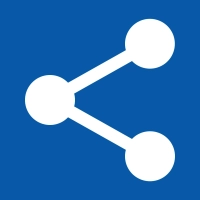The Future of Social Media: The Rise of Decentralized Networks
In the ever-evolving landscape of social media, a significant shift is underway. Moving away from the centralized hubs that have dominated the online space for years, a new era of decentralized social media is on the horizon. This revolutionary movement, often referred to as the "Decentralized Social Media Revolution," is breaking the chains of centralization and embracing peer-to-peer connectivity and blockchain integration. As we enter the Web3.0 era, this transformative shift is poised to revolutionize online interaction and create a more liberated and dynamic digital landscape. November 18, 2023 17:07
In this blog, we will explore the future of social media and the rise of decentralized networks, examining the pioneering technologies and distributed platforms that are set to reshape the way we connect and engage online.
The current state of social media
Before we delve deeper into the future of social media and its decentralized networks, it's important to understand the current state of social media. Over the past decade, social media platforms have become a central aspect of our daily lives. From connecting with friends and family to sharing photos, news, and thoughts, these platforms have revolutionized the way we communicate and interact with others.
However, as these centralized platforms have grown in popularity, concerns about privacy, data breaches, and content moderation have also emerged. Users are becoming increasingly aware of the power that these platforms hold over their personal information and the potential for misuse or manipulation. This has sparked a call for change and a demand for a more democratic and user-centric approach to social media.
While traditional social media platforms have undoubtedly brought people together and facilitated the exchange of ideas, the rise of decentralized networks presents an alternative vision for the future of social media. These networks aim to distribute power and control among their users, enabling greater privacy, transparency, and ownership over personal data.
In the next section, we will explore the key challenges faced by centralized social media platforms and how decentralized networks offer innovative solutions to address these concerns.
Disadvantages of centralized networks
Centralized networks, while popular and convenient, come with a set of disadvantages that users and society as a whole need to consider. One of the biggest concerns is the lack of control over personal data. With centralized platforms, users are required to provide extensive personal information, which is then stored and used by the platform for various purposes. This raises significant privacy concerns, as users have little control over how their data is used, shared, or protected.
Another disadvantage is the vulnerability to hacking and data breaches. Centralized networks become prime targets for hackers due to the vast amount of personal information they store. When a breach occurs, it not only compromises the privacy of users but also exposes them to potential fraud and identity theft.
Moreover, content moderation on centralized platforms has been a subject of controversy. There have been numerous instances of biased or inconsistent moderation practices, leading to the censorship of certain voices and the spread of misinformation. This undermines the open and democratic nature of social media.
In the next section, we will explore how decentralized networks address these disadvantages and provide a more user-centric and secure alternative to traditional social media platforms.
The rise of decentralized networks
In recent years, decentralized networks have gained traction as a promising solution to the problems associated with centralized social media platforms. These networks operate on a peer-to-peer basis, where data and control are distributed among a network of participants, rather than being centrally controlled by a single entity. This fundamental shift in architecture brings forth several advantages.
Firstly, decentralized networks prioritize user privacy. With these platforms, users have more control over their personal data. Instead of entrusting large corporations with their information, users can decide how much information they want to share and have the ability to verify who has access to it. This empowers individuals to protect their privacy and reduce the risk of their data being exploited.
Furthermore, decentralized networks are more resistant to hacking and data breaches. Unlike centralized platforms that have a single point of failure, decentralized networks distribute data across multiple devices and servers. This makes it extremely difficult for hackers to breach the system and gain access to sensitive information. The decentralized nature also reduces the impact and scope of any potential breaches, limiting the potential harm to users.
In addition, content moderation on decentralized networks is typically more transparent and community-driven. Instead of relying on a central authority to determine what is acceptable or prohibited content, decentralized networks often implement decentralized governance models. This ensures that decisions about content moderation are made collectively by the community, reducing the risk of censorship and promoting a more democratic and inclusive environment.
As decentralized networks continue to evolve and gain popularity, more individuals are recognizing the importance of regaining control over their own data and online experiences. These networks offer a promising alternative to the traditional social media landscape, providing a more secure and user-centric way to connect and share information. In the next section, we will explore some of the existing decentralized network platforms that are making waves in the social media industry. Stay tuned!
Benefits of decentralized networks
In this section, we will delve deeper into the benefits of decentralized networks and why they are gaining traction as the future of social media.
1. Enhanced Privacy: Decentralized networks prioritize user privacy by allowing individuals to control their personal data. Instead of relying on large corporations to safeguard their information, users can choose what data to share and who has access to it. This shift empowers users to protect their privacy, mitigating the risk of data exploitation.
2. Resilience to Hacking: Unlike centralized platforms with a single point of failure, decentralized networks distribute data across multiple devices and servers. This makes it incredibly challenging for hackers to breach the system and access sensitive information. The decentralized nature reduces the impact and scope of potential breaches, enhancing security for users.
3. Transparent & Community-driven Content Moderation: Content moderation on decentralized networks is often more transparent and driven by the community. Instead of relying on a central authority to make decisions about acceptable content, decentralized networks implement decentralized governance models. This collective decision-making process reduces the risk of censorship and fosters a more democratic and inclusive online environment.
4. Ownership and Control: With decentralized networks, individuals maintain ownership and control over their content. Unlike centralized platforms that can enforce arbitrary rules or algorithms, decentralized networks offer users the freedom to shape their online experiences and connect with others on their own terms.
As decentralized networks continue to evolve and gain prominence, it is clear that they offer significant advantages over traditional social media platforms. In the next section, we will explore some of the existing decentralized network platforms that are making waves in the social media industry. Stay tuned to discover how these platforms are revolutionizing the way we connect and share in the digital age.
6. Examples of decentralized networks
While decentralized networks are still in the early stages of development, several platforms have already emerged as frontrunners in the race to redefine social media. These platforms aim to give users more control over their data and create a more inclusive online environment. Here are a few notable examples:
a. Mastodon: Mastodon is a decentralized microblogging platform that resembles Twitter. It allows users to set up their own servers, called instances, and connect with users from different instances. With features like content warnings and robust privacy settings, Mastodon emphasizes user autonomy and customization.
b. Steemit: Steemit is a decentralized social media platform built on blockchain technology. It rewards users for creating and curating content by offering cryptocurrency incentives. This unique reward system encourages active participation and aims to create a fairer distribution of wealth among content creators.
c. Solid: Developed by Sir Tim Berners-Lee, the creator of the World Wide Web, Solid is an open-source project that aims to give users control over their data. It allows users to store their data in "pods" and decide who can access it. Solid's vision is to enable individuals to choose their preferred apps and services while maintaining ownership of their personal data.
These examples represent the diversity and potential of decentralized networks in revolutionizing social media. As they continue to evolve and gain traction, we can expect exciting advancements in user privacy, security, and content moderation. Stay tuned for the next section, where we will explore the challenges and potential roadblocks that decentralized networks may face in their journey towards mainstream adoption.
Challenges and considerations of decentralized networks
As decentralized networks gain momentum in their journey towards reshaping social media, it is crucial to acknowledge the challenges and considerations they may face. While these networks hold immense potential, there are certain hurdles that need to be addressed for them to achieve mainstream adoption.
a. Scalability: One of the primary concerns of decentralized networks is scalability. As more users join these networks, the infrastructure to support the growing user base needs to be robust and efficient. Developers must find innovative solutions to ensure smooth user experiences and avoid network congestion.
b. User Experience: Another important aspect is enhancing the user experience. Decentralized networks should strive to provide a seamless and intuitive interface, making it easy for users to navigate and engage with the platform. User-friendly features and functionalities will be crucial in attracting and retaining a broader audience.
c. Regulation and Governance: The decentralized nature of these networks raises questions around regulation and governance. Without a central authority overseeing content and user interactions, ensuring security, preventing abuse, and maintaining a fair ecosystem becomes a challenge. Striking the right balance between freedom and responsibility will be critical to the success of decentralized networks.
d. Adoption and Awareness: Lastly, decentralized networks need to tackle the hurdle of adoption and awareness. While they offer unique benefits, many users are still unfamiliar with this alternative form of social media. Educating and encouraging users to embrace decentralized networks will play a significant role in their widespread acceptance.
As we delve deeper into the future of social media and the rise of decentralized networks, it is essential to closely examine these challenges. Despite these roadblocks, the potential for a more inclusive, secure, and user-controlled online environment is undeniable. Join us in the next section, where we will explore the solutions and strategies that can help overcome these challenges and create a better future for social media.
The future of social media: the dominance of decentralized networks
In this final section, we will explore how decentralized networks could potentially dominate the future of social media. While the challenges discussed earlier are significant, there are several factors that suggest a promising future for these networks.
Firstly, the growing disillusionment with traditional social media platforms due to concerns surrounding privacy, data breaches, and censorship has fostered a sense of urgency for alternatives. This has presented an opportunity for decentralized networks to gain traction and attract users who value transparency, control over their data, and freedom of expression.
Secondly, advancements in blockchain technology and decentralized protocols are addressing the scalability issue. Solutions such as sharding and layer two protocols are being developed to ensure that decentralized networks can handle large user bases without sacrificing performance. This scalability will play a crucial role in attracting users and encouraging widespread adoption.
Moreover, the user experience is continuously improving in decentralized networks. Developers are focused on building intuitive interfaces, seamless interactions, and user-friendly features. By prioritizing usability, these networks can appeal to a wider audience and compete with traditional social media platforms.
Additionally, the global effort to regulate centralized networks and address privacy concerns has raised awareness about decentralized alternatives. Governments and regulatory bodies are increasingly recognizing the benefits of decentralized networks and exploring ways to support their growth. This increased awareness will aid in overcoming the hurdle of adoption.
By addressing these challenges and leveraging these opportunities, decentralized networks have the potential to dominate the future of social media. As users become more conscious of their privacy, the need for user-controlled platforms will continue to grow. Join us in the next section, as we conclude our exploration of the future of social media and the role decentralized networks will play in shaping it.
Conclusion
In conclusion, decentralized networks hold great promise for the future of social media. The growing disillusionment with traditional platforms, along with concerns about privacy and censorship, has created a demand for alternatives that offer transparency, data control, and freedom of expression. The advancements in blockchain technology and decentralized protocols are addressing scalability issues, ensuring that these networks can handle large user bases without compromising performance. Additionally, the improvement in user experience and the global effort to regulate centralized networks and address privacy concerns are increasing awareness about decentralized alternatives. By overcoming challenges and leveraging opportunities, decentralized networks have the potential to dominate the social media landscape. Join us in our next blog series as we dive deeper into the implications and possibilities of a decentralized social media future.
User Comments (0)
Popular DeSo Apps










